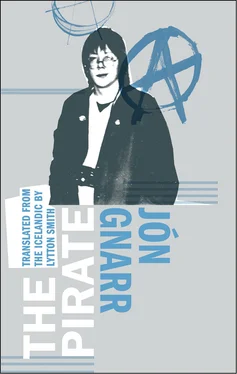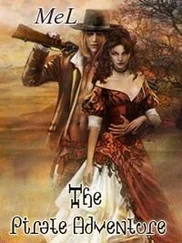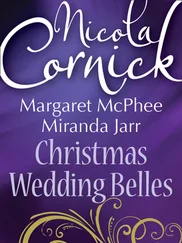Jón Gnarr - The Pirate
Здесь есть возможность читать онлайн «Jón Gnarr - The Pirate» весь текст электронной книги совершенно бесплатно (целиком полную версию без сокращений). В некоторых случаях можно слушать аудио, скачать через торрент в формате fb2 и присутствует краткое содержание. Год выпуска: 2016, Издательство: Deep Vellum Publishing, Жанр: Современная проза, Биографии и Мемуары, на английском языке. Описание произведения, (предисловие) а так же отзывы посетителей доступны на портале библиотеки ЛибКат.
- Название:The Pirate
- Автор:
- Издательство:Deep Vellum Publishing
- Жанр:
- Год:2016
- ISBN:нет данных
- Рейтинг книги:3 / 5. Голосов: 1
-
Избранное:Добавить в избранное
- Отзывы:
-
Ваша оценка:
- 60
- 1
- 2
- 3
- 4
- 5
The Pirate: краткое содержание, описание и аннотация
Предлагаем к чтению аннотацию, описание, краткое содержание или предисловие (зависит от того, что написал сам автор книги «The Pirate»). Если вы не нашли необходимую информацию о книге — напишите в комментариях, мы постараемся отыскать её.
." — "If there were more people like Jón Gnarr the world wouldn't be in such a mess." — The second book in a trilogy chronicling the troubled childhood of international sensation Jón Gnarr,
revisits his teenage years with sincere compassion and great humor: bullied relentlessly, Jón receives rebellious inner strength through the Sex Pistols and Prince Kropotkin — punk rock and anarchy offer the promise of a better and more exciting life.
Jón Gnarr
The Pirate — читать онлайн бесплатно полную книгу (весь текст) целиком
Ниже представлен текст книги, разбитый по страницам. Система сохранения места последней прочитанной страницы, позволяет с удобством читать онлайн бесплатно книгу «The Pirate», без необходимости каждый раз заново искать на чём Вы остановились. Поставьте закладку, и сможете в любой момент перейти на страницу, на которой закончили чтение.
Интервал:
Закладка:
“What are you doing? What’s happening? Where are you going?”
I took off as quick as my feet could carry me and never looked back. My heart thrashed in my breast as I ran down to Hlemmur. When the kids showed up in the morning, I told them about my night’s adventure. Some of them recognized the guy and said he was a pervert. A few days later we went together to his house. The older punks had joined us and were at the forefront. I hid myself behind them. They rang the apartment doorbell, but I was afraid to be near the head, afraid to even see the place. The door opened shortly with a low whine. I feared for my life a little. The kids, however, took charge and went into the corridor. The old man came out onto the landing, and I heard them call:
“Are you a pervert? Are you a pervert?”
“Go away or I’ll call the police,” he cried.
“Then we’ll tell the police that you’re nothing but a pervert. You’re just a fucking pervert who perverts children!”
“That’s not true!”
I saw him through the door. The boy who was standing in the doorway pointed at him and asked me:
“Is this the pervert who was hitting on you?”
I couldn’t speak but nodded and looked away. The old man made like he had never seen me before.
“Get lost or I’ll call the police!”
“Demonic pervert! Leave kids alone!”
Other folk in the apartments around the stairwell came onto the landing, but the guy rushed back inside and slammed the door behind him.
“What is going on here?” asked an old woman.
“This pervert was trying to molest a small boy.”
I saw the guy peep out of the kitchen window. I made myself safe across the street and waited for the older kids, who came out shortly after screaming abusive language and banging on the front door. “Demonic pervert,” someone said, just to say it one more time. We dawdled about in front of his house, which I felt tremendously uncomfortable about having returned to. I wished wholeheartedly that I hadn’t come with them, and I felt miserable and half-witted. Why had I gone home with him? How could I be so stupid? I blamed myself for everything. It was my fault. I should not have gone home with him. I felt almost more of an idiot than he was. What on earth led me to think some old, gray-haired guy owned any punk albums?
“Let’s just go,” I said, downcast.
The kids continued to curse the guy. I don’t know who picked up a stone. The kitchen windowpane splintered with a loud crack. We took to our feet and ran away.
We often went to the shops and asked for stuff on credit or chased after someone and begged them for money. Many people seemed to think that we were on drugs, but that was way off base since none of us were regularly using anything hard. Many of us huffed but usually not in Hlemmur. The most common substance used was glue from puncture repair kits: UHU. We would go together into an alley or a trash shed around the back of a house, empty the UHU tube into a plastic bag, and inhale. The rush was brief — dizzy head, blurred vision, giggling. The giggling, however, was perhaps more from nervousness and the tension than the effects of the substance. Sometimes, someone had crumbs of cannabis and was even willing to share. Usually this was true of the older kids, who were working and could afford to buy cannabis, unlike us younger kids, who couldn’t and anyway had no connections with any dealers. Cannabis was usually smoked at home inside your room with someone. You’d only have one or two people smoking, but you always got a good buzz. It broke the malaise, created a nice tension and a diversion and, in the best cases, some feelings of joy. Contentment. Besides huffing, wine, and the occasional hit of cannabis, we also sometimes had pills. Usually it was something that someone had stolen from their parents or someone else. The winos would also sometimes slip us pills. They were usually sedatives like Diazepam and Valium but occasionally stimulants like Ritalin. However, there was one drug that could get us high that we could get in pharmacies: seasickness tablets. If you took enough of them, it left you in a strange state and you could even have hallucinations, see weird sights and hear voices.
If the weather was good, we’d go walking around town, down Laugavegur and Lækjartorg. It was possible to hang out and meet people there. Sometimes, there was an outdoor market at Lækjartorg where people were selling homemade jewelry and all kinds of stuff. But we weren’t allowed inside anywhere. The traders didn’t want to see us in their booths. We couldn’t even get served in cafes. It wasn’t much of a hardship since we never had any money anyway. We weren’t allowed inside the shops, either, and frequently heard:
“Get out, kids! Out if you aren’t going to buy anything. Out with you, or I’ll call the police!”
People in the streets gave us a wide berth, and we noticed that they were afraid of us. It was fun to be so notorious. It was exciting.
Life at Hlemmur was all about hanging out. Some kids could sit on the same bench for hours without doing anything, though not me. I always had to be on the move or at least talking to someone. And though I could find camaraderie among the kids in Reykjavík, in many ways there was always something lacking. There was something that separated me from them. For example, they had no interest in books. I had a burning interest in reading and sometimes even brought books to read on the bus or at Hlemmur. Most of the kids knew who Þórbergur Þorðarson was. But none of them seemed to have any particular interest in anarchism, and my ideas for an Anarchist Land didn’t entice them. I didn’t go to Hlemmur just to hang. I was on a quest for knowledge. I was looking for solidarity, for mutual interests, for others like me. The kids at Hlemmur had surrendered to the system. I wanted to change the system and wanted to meet someone who had ideas and who could tell me something that would help me improve things for myself, see things from a new perspective. But the kids at Hlemmur were not interested in anything and were indifferent about most everything. For them, that was punk. But not for me. I saw punk as life and creativity, not stagnation and loss of feeling. It was about becoming able to refuse to participate in the nonsense that was everywhere imposed upon us. It was a powerful uprising. Punk screamed at the system and demanded change. It was revolutionary anarchism. The two things were an integral part of each other. Punk was the body, but the soul was anarchism. I refused to give up and wanted to be more aware and better informed. I wanted people to recover their senses, to understand injustice, and then everything would change. But I did not know how you achieved that. How do you change people? I knew, at least, that it had something to do with mindset. If people changed their mindsets, their actions would change, too. You act as you think. But how to change others’ mindsets? With words? Adaptation? Acting as a model?
“You have to break down in order to build up,” Siggi the Punk sometimes said.
I thought about it. Was that right? And what was it you had to break down? And how? Was violence the only way? Rebellions and revolutions were usually violent. Screaming people with guns and flags, on a rampage, smashing in windows and setting fire to cars. That couldn’t be the only way. The system is like the Morons: it’s always stronger, and if it uses force on you and you respond with violence, then it simply applies yet more violence.
The cops were the biggest enemy for my peers. They saw everything about the police as bad. To them, the police were fascists, malicious people who enjoyed power and picking fights with others and so became cops. But I knew better. I was brought up around cops. Cops were just people like everyone else. Most of Dad’s friends were all right. Dad had joined the cops because at the time it was the only job he could get. For me, the police was only an extension of the mentality of society. What the police did was not their issue but the whole community’s. It was pointless to fight the cops. It was only fighting windmills. Most people are good and wish others well, but in all groups there are morons, and unfortunately they often seem to draw more attention than others, and so people judge whole groups based on the Morons. This also applies to us kids. If some punk broke in somewhere or did something wrong, then there would be news about it in the papers and even a picture. People who read the news would then condemn all punks based on that. But we were not all alike, and most of us never did anything wrong. Most punks were good kids. I think that’s true everywhere, in politics, religion, the workplace, everywhere where people are grouped together. It’s not advisable to take only those who draw attention because they’re troublesome or evil and then judge the entire group from those people. That’s akin to trying to cure cancer by killing all cancer patients. To eliminate the problem, you have to go to the root, and the root lies deep in the mysterious minds of people. That was where I wanted to get to, I wanted to reach them. I wanted more openness and tolerance. I wanted people to be more varied and less alike. I wanted people to be nicer to each other, too. But not like hippies. They were just jerks and losers who beat their kids but protected flies.
Читать дальшеИнтервал:
Закладка:
Похожие книги на «The Pirate»
Представляем Вашему вниманию похожие книги на «The Pirate» списком для выбора. Мы отобрали схожую по названию и смыслу литературу в надежде предоставить читателям больше вариантов отыскать новые, интересные, ещё непрочитанные произведения.
Обсуждение, отзывы о книге «The Pirate» и просто собственные мнения читателей. Оставьте ваши комментарии, напишите, что Вы думаете о произведении, его смысле или главных героях. Укажите что конкретно понравилось, а что нет, и почему Вы так считаете.











